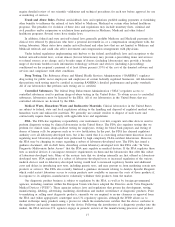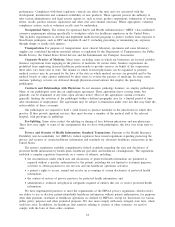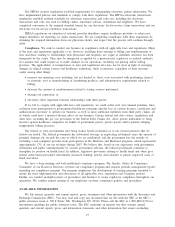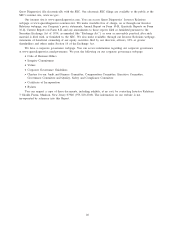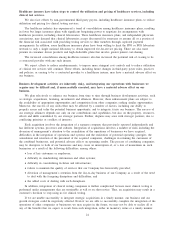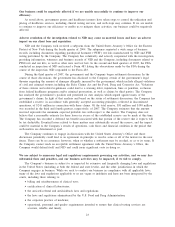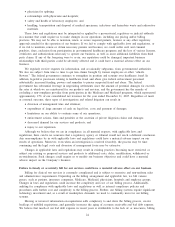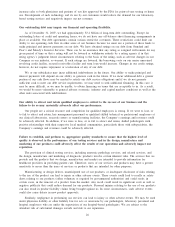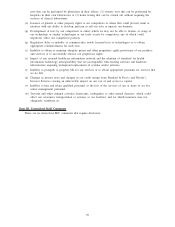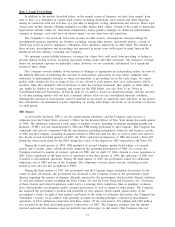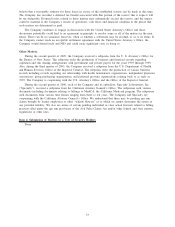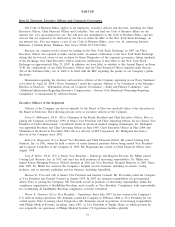Quest Diagnostics 2007 Annual Report Download - page 36
Download and view the complete annual report
Please find page 36 of the 2007 Quest Diagnostics annual report below. You can navigate through the pages in the report by either clicking on the pages listed below, or by using the keyword search tool below to find specific information within the annual report.The failure of our IT systems to keep pace with technological advances may significantly reduce our
revenues or increase our expenses.
Public and private initiatives to create healthcare information technology (HCIT) standards and to mandate
standardized clinical coding systems for the electronic exchange of clinical information, including test results,
could require costly modifications to our existing HCIT systems. While we do not expect HCIT standards to be
adopted or implemented without adequate time to comply, if we fail to adopt or delay in implementing HCIT
standards, we could lose customers and business opportunities.
Our operations and reputation may be impaired if we do not adequately secure information.
In our business, we generate or maintain sensitive information, such as patient data. If we do not adequately
safeguard that information and it were to become available to persons or entities that should not have access to
it, our business could be impaired and our reputation could suffer.
We are subject to numerous political, legal, operational and other risks as a result of our international
operations which could impact our business in many ways.
Although we conduct most of our business in the U.S., our expanding international operations increase our
exposure to the inherent risks of doing business in international markets. Depending on the market, these risks
include, without limitation:
•changes in the local economic environment;
•political instability;
•social changes;
•intellectual property legal protections and remedies;
•trade regulations;
•procedures and actions affecting approval, production, pricing, reimbursement and marketing of products
and services;
•exchange controls;
•weak legal systems which may affect our ability to enforce contractual rights;
•changes in local laws or regulations; and
•potentially longer payment and collection cycles.
International operations also require us to devote significant management resources, to implement our
controls and systems in new markets, to comply with the U.S. Foreign Corrupt Practices Act and similar laws in
local jurisdictions and to overcome challenges based on differing languages and cultures.
We expect to expand further our international operations, through acquisition or otherwise, which would
increase these risks. As a result of these risks, our financial condition or results of operations could be materially
adversely affected.
Our operations may be adversely impacted by the effects of natural disasters such as hurricanes and
earthquakes, hostilities or acts of terrorism and other criminal activities.
Our operations may be adversely impacted by the effects of natural disasters such as hurricanes and
earthquakes, hostilities or acts of terrorism or other criminal activities. Such events may result in a temporary
decline in the number of patients who seek clinical testing services. In addition, such events may temporarily
interrupt our ability to transport specimens, to receive materials from our suppliers or otherwise to provide our
services.
Adverse results in material litigation could have an adverse financial impact and an adverse impact on our
client base and reputation.
We are involved in various legal proceedings arising in the ordinary course of business including, among
other things, disputes as to intellectual property, professional liability and employee-related matters, as well as
inquiries from governmental agencies and Medicare or Medicaid carriers regarding billing issues. Some of the
proceedings against us involve claims that are substantial in amount and could divert management’s attention
from operations. The proceedings also may result in substantial monetary damages, as well as damage to our
27


